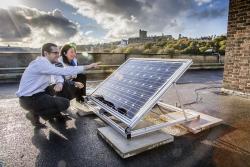Newsletters
The latest developments in solar energy to be highlighted at ����ֱ��
 ����ֱ��'s School of Electronic Engineering will host to the (Photovoltaic Science, Application and Technology) conference this month (5-7 April), bringing together the brightest and best scientists in the field of solar for the most important conference on solar energy research in the UK.
����ֱ��'s School of Electronic Engineering will host to the (Photovoltaic Science, Application and Technology) conference this month (5-7 April), bringing together the brightest and best scientists in the field of solar for the most important conference on solar energy research in the UK.
Around 5% of our electricity is produced from solar energy in the UK, with a 25% increase in solar energy production in recent years and a constantly reducing production cost, solar is one of the cheapest forms of energy production so the future looks bright for solar. It remains a popular research area in the science and engineering sector of UK universities.
The PVSAT conference has a strong focus on perovskite solar cells, which are one of the hot topics in scientific research and matched only by graphene in terms of number of scientific papers in physics and engineering journals last year. Perovskite solar cells are based on hybrid organic-inorganic lead or tin halide-based material and tests have shown these to be 22 % efficient. By using perovskite solar cells in conjunction with traditional silicon-based technologies, it is predicted that a hybrid perovskite and silicon solar device could reach 44% efficiency, which would represent a major achievement and significantly reduce costs.
Top research scientists such as Professor Christophe Ballif will be presenting at the conference next week. Professor Ballif is the Director of the PV laboratory at Ecole Polytechnique Fédérale de Lausanne (EPFL) and Director of PV Development at Centre Suisse d' Electronique et de Microtechnique (CSEM) in Neuchâtel; he won the 2016 Becquerel Prize - an award created by the European Commission to recognize outstanding contributions by an individual to the development of solar power. Industrial players such as Heliatek GmbH will also be presenting, this company is developing new types of building materials that incorporate solar cells which will enable buildings to create their own power.
The conference will be hosted by ����ֱ��’s Dr Jeff Kettle from the School of Electronic Engineering who said:
“The conference brings together the leading academics in this field. The UK remains the forefront of this area of research with a number of world-leading academics in solar energy based here. The event has attracted sponsorship from a number of major organisations such as the Institute of Physics (IOP), IET, Royal Society of Chemistry and the engineering Research Network Wales.“
Prof Michael G Hutchins, Secretariat of the Solar Energy Society (UK-ISES) commented:
“The Solar Energy Society was delighted to be able to host the conference at ����ֱ�� this year, given the expertise of Bangor academics in this field and the beautiful setting it was the perfect choice for the conference, now in its 13th year.”
One of the associate sponsors of the event is ����ֱ��’s new Science park project M-Sparc. Pryderi ap Rhisiart, Project Manager, said “We are very aware that our building needs to not only look good and be fit for purpose, but also be an example of the importance of low carbon emissions. We have some innovative solutions for this within the building’s design, and are using PV panels on the site, which is why we’re very excited for the opportunity to sponsor this event in Bangor. The hope is that once M-SParc is operational, many more such events can be held, to put North Wales on the map of sustainability”.
Publication date: 3 April 2017
